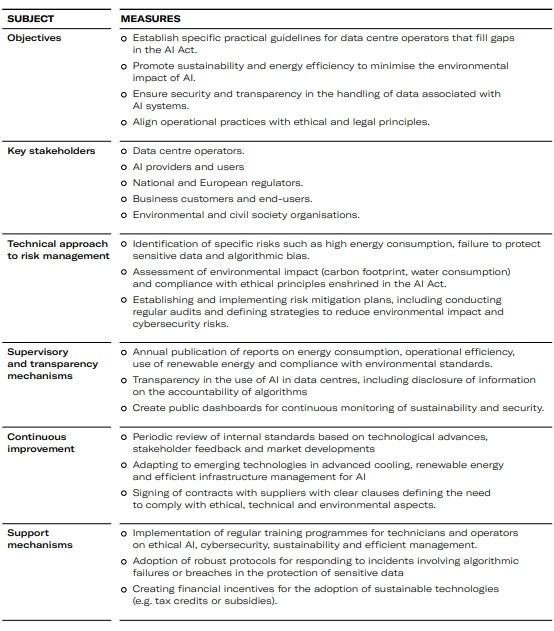- in European Union
- in European Union
- in European Union
- within Insurance, Litigation, Mediation & Arbitration and Antitrust/Competition Law topic(s)
The European Artificial Intelligence Regulation (AI Act) establishes a regulatory framework to ensure the ethical and safe use of AI. However, in the context of data centres, there is still a need to understand the environmental impact of their use.
Impact for data centres
The growing demand for computing resources driven by AI has increased the need for efficient and resilient data centres. However, the exponential increase in energy consumption and use of natural resources presents regulatory and sustainability challenges.
Regulatory trends and operational challenges
- Sustainability and energy efficiency: According to a McKinsey study[4], data centre energy consumption could triple by 2030. Implementing solutions such as liquid cooling, renewable energy and waste heat recovery is therefore a necessity.
- Infrastructure adapted to AI:Data centres are being redesigned to support specialised hardware and intensive workloads. These workloads refer to the high computational demands of AI applications, such as machine learning and deep learning models, which require large amounts of compute capacity and storage. Tools such as digital twins, which are virtual replicas of physical data centre systems, allow resource consumption to be optimised, improving efficiency and ensuring compliance with regulatory standards.
- Social and regulatory pressures: Some countries, such as Ireland, have already imposed restrictions on the development of new data centres in certain regions due to the environmental impact. The AI Act requires transparency and risk management, but still lacks specific provisions to mitigate the environmental impact[5] of this type of infrastructure.
Competitiveness and innovation: Adopting good environmental practices can not only reduce costs, but also give sector operators a competitive edge by aligning with compliance and ESG initiatives.
Industry opportunities and responses
Inter-institutional cooperation: Dialogue between data centre operators and regulators can help implement policies that balance technological innovation and environmental responsibility[6].
Modular and scalable infrastructures: Adopting flexible operational expansion models can optimise resources and reduce environmental impact.
Transparency as a competitive advantage: Adopting good environmental practices and impact reporting can promote public acceptance and sustainable investment.
Self-regulation as a complement to the IA law
In the absence of specific rules on sustainability in the AI Act, the sector can choose to promote self-regulatory practices, which can focus on the following points:

The adoption of self-regulatory mechanisms also requires a proper balancing of the inherent challenges and benefits, such as:

Conclusion
The convergence of regulation and sustainable innovation will be critical to the future of data centres in the age of artificial intelligence. Anticipating regulatory requirements and adopting sustainable solutions will not only ensure compliance with the applicable regulatory framework, but will also be a competitive strategy and differentiator required to deploy these infrastructures.
Footnotes
1. Regulation (EU) 2024/1689 of the European Parliament and of the Council of 13 June 2024
2. The AI Act applies to various types of operators, including suppliers, users and distributors of AI systems. The obligations vary according to the type of operator, and are stricter for suppliers (Articles 25, 29 and 30 of the AI Act).
3. According to Article 2 of Delegated Regulation (EU) 2024/1364, it should be understood that: 'enterprise data centre' means a data centre that is operated by an enterprise, and of which the sole purpose is to deliver and manage the information technology needs of the enterprise.
4. Mckinsey - The role of power in unlocking the european ai revolution.
5. AI_Climate_and_Regulation_From_Data_Centers_to_the.pdf
6. See the International Energy Agency's proposed approach.
The content of this article is intended to provide a general guide to the subject matter. Specialist advice should be sought about your specific circumstances.




